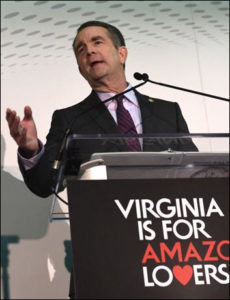Michael Martz has done an excellent job reporting on the political factors that shaped the incentive package that induced Amazon, Inc., to select Crystal City-Potomac Yard in Northern Virginia along with New York City to co-host its massive expansion. The article illuminates the critical role of the little-known Major Employment and Investment Project Approval Commission (MEI), in forging the incentives.
As its name suggests, the legislative commission provides oversight of incentives for economic-development projects, and its input was essential for a project that would require budget approval for an estimated $1.85 billion in state expenditures on direct incentives, transportation projects, and higher-ed funding.
While Stephen Moret, president of the Virginia Economic Development Partnership (VEDP) was the administration’s point man on the deal, it is apparent from Martz’ reporting that state Secretary of Finance Aubrey Layne was a key player in the negotiations. “VEDP’s role was to get the deal done,” Layne told the Times-Dispatch. “My role was to make sure we were partners and kept in communication with MEI and the money committees.
Crafting the Amazon deal required political calculations on how to sell the biggest incentive package in the history of Virginia to the General Assembly. One MEI member, House Finance Chairman Lee Ware, R-Powhatan, resigned from the commission in February in protest of the immense size of the incentives offered the e-commerce giant, the biggest company (by market value) on the planet. At least one other member, Del. Steven Landes, R-Augusta, remained undecided until negotiations coughed up $250 million in state funds toward creation of Virginia Tech’s proposed $1 billion Innovation Campus next to the Amazon campus.
Some of the key political considerations:
Cash flow positive. The $550 million in job-creation incentives for Amazon was structured so that state payments to Amazon will be delayed until after income- and sales-tax revenue from the new jobs roll into the state treasury. That way, the deal will be cash-flow positive for the state from year one.
Sustained Metro funding. Amazon was a significant factor in the General Assembly’s decision in the 2018 session to contribute $154 million a year as Virginia’s share for the recapitalization of the decrepit Washington Metro mass transit system. Access to mass transit was a key consideration for Amazon. Said Jason Miller, executive director of the Greater Washington Partnership: “It was a pretty clear signal that because of the importance of the system to both the economy and Amazon, the region can come together and tackle its most pressing issues.”
More STEM degrees. The General Assembly also committed $28 million this year to boost production of undergraduate degrees in computer science and other technical fields as well as $25 million to the CyberX cyber-security education initiative to strengthen Virginia’s technology talent pipeline. In Layne’s estimation the educational commitments may have been more important to Amazon than the direct incentives for job creation. “Incentives didn’t really drive the decision,” said Layne. “At the end of the day, it was the workforce development and education pieces, which we already had decided were going to happen regardless.”
NoVa transportation money only. The Commission made it clear that funds designated for transportation improvements around the Amazon site would not come from general transportation funds. Instead, the state will tap federal transportation dollars restricted to Northern Virginia and toll-concession revenues from the Interstate 95 express lanes. “It was not taking any money from anyone else in the commonwealth — that was key,” said Layne.
Affordable housing a local responsibility. The commission balked at a proposal to offer $100 million in state subsidies to maintain affordable housing in Northern Virginia. Both legislators and the administration agreed that housing was the proper role of local governments and private developers.
Splitsville. Amazon’s decision to split the HQ2 project — a total of $5 billion in investments and 50,000 jobs — between Northern Virginia and New York City actually made the deal more attractive for Virginia. Said House Appropriations Chairman Chris Jones, R-Suffolk: “We felt that it was a better fit for us because it was more digestible.”



